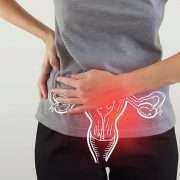Menopause Symptoms: How To Reduce Them?

Menopause, while many find it daunting, is a completely natural bodily process that all women go through in their life. It is nothing to be afraid or ashamed of but does have uncomfortable symptoms which can be managed naturally.
So, what exactly is Menopause?
Menopause is the term used to describe the end of a woman’s monthly menstrual cycle. All women are born with eggs that are preserved inside their ovaries. The ovaries control the release of the eggs which happens once a month during a woman’s menstruation. The ovaries are also responsible for producing the hormones of estrogen and progesterone, which are essential for women’s health.
Menopause occurs when the ovaries no longer release eggs every month during the mid-life of a woman, generally anytime after her forties.
What characterizes menopause?
Menopause is characterized by uncomfortable symptoms which begin years prior to menopause occurs. They include:
- Hot flashes
- Irregular periods
- Vaginal dryness
- Chills
- Slow metabolism
- Weight gain
- Sleep problems
- Night sweats
- Skin pigmentation
- Anxiety
How To Reduce Menopause Symptoms?
For the right menopause care, it is important to understand the tried and tested methods that can reduce menopausal symptoms. These are:
1. Consuming Calcium and Vitamin D Rich Foods
Due to the hormonal changes that women go through as they come close to menopause, their bones can get weak. Therefore, it is important to consume vitamin D and calcium-rich food or even tablets for strong bones.
Now, for vitamin D, the best source is natural sunlight while for calcium, you can consume:
- Green leafy vegetables, such as kale, spinach, and collard greens
- Tofu
- Beans
- Sardines
- Fish
- Milk and dairy-rich food
2. Maintaining Your Weight
As a woman starts approaching the natural state of menopause, it is very to begin gaining excess weight. Unfortunately, this can put you at risk of heart disease, high cholesterol, and more diseases associated with obesity.
We highly recommend keeping this in check by exercising daily and following a rich protein diet that is filled with healthy fruits and vegetables. Even if you feel fatigued, a light workout will help you prevent weight gain and you will thank yourself for this in the future!
3. Avoiding Symptom-Inducing Foods
There are chances that a few food items may trigger your menopausal symptoms such as hot flashes, night sweats, and mood changes. Some of these trigger foods include alcohol, caffeine, spicy food, or sugary foods. While it is recommended to avoid all these food groups, pay close attention to your own body’s reaction to certain foods that may be acting as physical triggers. Avoid any foods you feel are making your symptoms worse.
4. Eating Phytoestrogens-Rich Foods
Phytoestrogens are found in plant-based food that fulfills the role of estrogen in your body. This helps reduce any hot flashes. However, it is important that you consume only the required amount every day, i.e., 40-70 milligrams. Phytoestrogens-rich foods include;
- Soybean
- Tofu
- Tempeh
- Beans
- Sesame seeds
- Linseeds
- Flaxseeds
4. Keeping yourself hydrated
Finally, it is incredibly important that you drink at least 8 to 12 glasses of water every day. This can help reduce any bloating that occurs due to hormonal changes.
Are you someone who is struggling with the symptoms of menopause and looking for a natural cure?
Look no further than Plix Life’s Meno Care. It is naturally formulated especially for women experiencing the symptoms of menopause. Meno Care is an all-natural product created just for women and can help:
- Control anxiety
- Strengthen your joints
- Combat hot flashes
- Reduce any skin damage
- Pump up your energy
- Help you sleep well
All you need to do is mix one scoop of powder in a glass of water and gulp it down. You will notice an immense difference in all your menopausal symptoms in just one month. Try it today to enjoy stress-free menopause.














